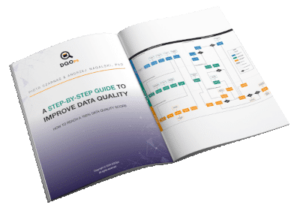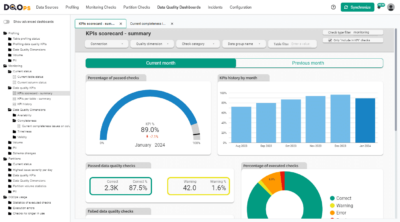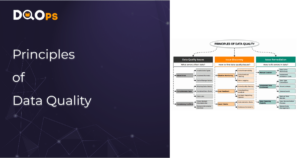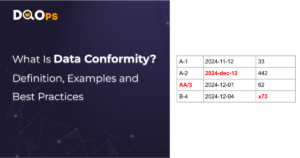Who needs data quality
Data quality is the unsung hero of the digital age. It’s the difference between insightful decisions and costly mistakes, between smooth operations and frustrating bottlenecks. High-quality data is accurate, complete, consistent, and timely. Without it, organizations struggle to understand their customers, optimize processes, or make informed predictions. Yet, data quality isn’t the sole responsibility of a single team. It’s a cross-functional effort, touching every corner of a company.
Data architects play a crucial role in orchestrating this effort. They’re the ones designing the blueprints for data integration and management. By planning for seamless integration with data quality platforms from the outset, they empower various teams to monitor, diagnose, and resolve data issues. This proactive approach ensures that everyone, from business leaders to data scientists, has access to reliable information, fueling better outcomes across the board.
The list of stakeholders touched by data quality is extensive: Business application owners (responsible for systems like CRM) rely on accurate data to serve customers effectively. Data platform owners ensure the underlying infrastructure is robust and trustworthy. Business leaders and executives depend on data for strategic decision-making. Data analysts uncover insights from data to drive action. Data engineers build and maintain the pipelines that collect and process data. Data scientists use data to train models and make predictions. Data stewards ensure data adheres to standards and regulations. And data operations teams are on the front lines, troubleshooting issues and maintaining data integrity.
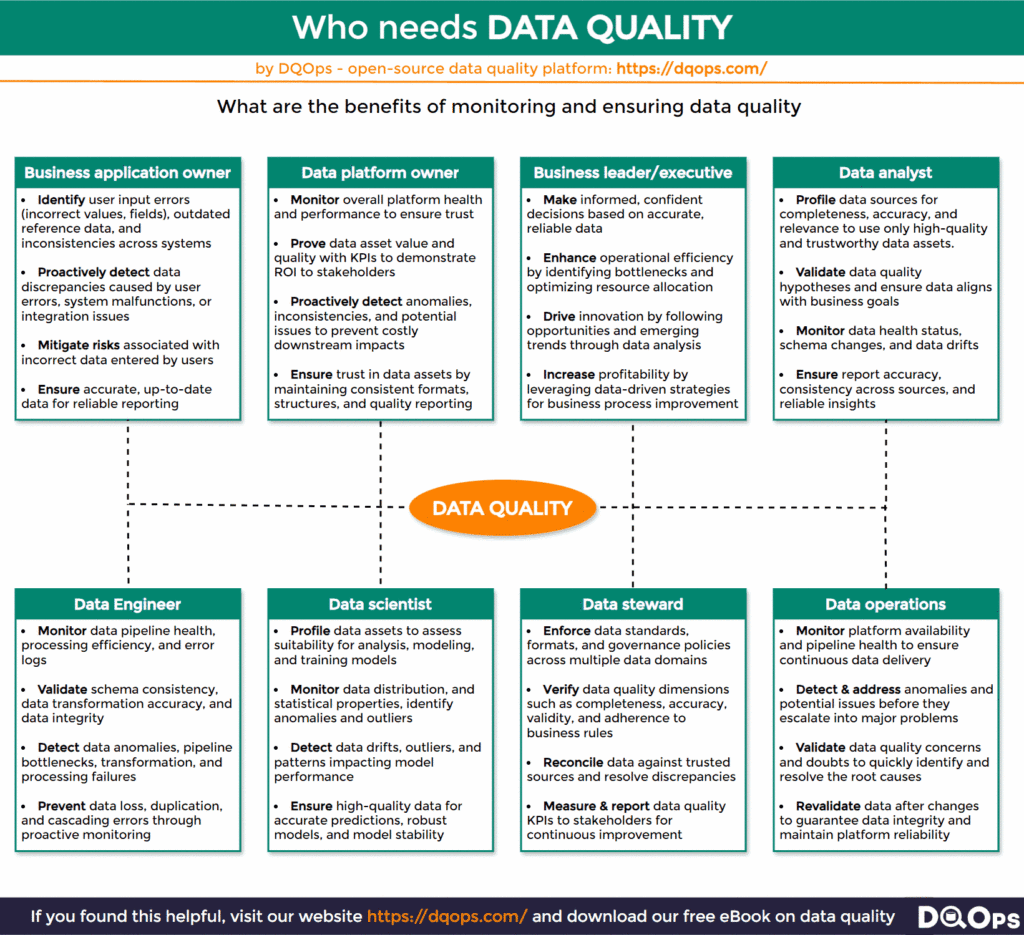
Table of Contents
Business application owner
Business application owners, such as those managing CRM or ERP systems, are on the front lines of data quality. They’re responsible for ensuring that the critical business systems used by employees across the organization are fueled by accurate, up-to-date data. Poor data quality can lead to a cascade of problems, from incorrect customer information hindering sales efforts to outdated product catalogs causing confusion and lost opportunities. By proactively identifying and resolving data inconsistencies, user input errors, and outdated reference data, business application owners can mitigate these risks and improve overall operational efficiency. A well-maintained system not only streamlines processes but also empowers employees to make informed decisions based on reliable information, leading to a more productive and successful organization.
Data Platform Owner
Data platform owners are the stewards of an organization’s data infrastructure. They oversee critical systems like data lakes, data warehouses, and other repositories that house the organization’s most valuable asset – its data. Their role in ensuring data quality is paramount. By meticulously monitoring the health and performance of the data platform, they ensure smooth operations and efficient data processing. They establish trust and confidence in the data by maintaining consistent formats, structures, and transparent reporting on data quality metrics. Proactive detection of anomalies and potential issues helps them prevent costly downstream impacts, safeguarding the integrity and reliability of the data upon which the entire organization depends. By proving the value of the data platform with concrete KPIs, they demonstrate a return on investment and reinforce the importance of their role in the data ecosystem.
Business Leader/Executive
Business leaders and executives hold the reins of decision-making within organizations, and their choices ripple throughout the company. High-quality data acts as their compass, guiding them towards informed, strategic decisions that drive growth and success. When equipped with accurate, reliable information, leaders can confidently navigate complex business landscapes, optimizing operations, mitigating risks, and identifying lucrative opportunities. By leveraging data-driven insights, they can refine pricing strategies, tailor marketing campaigns to resonate with target audiences, and enhance customer retention efforts. Ultimately, prioritizing data quality empowers business leaders to make sound judgments that propel their organizations towards increased profitability and a sustainable competitive advantage.
Data Analyst
Data analysts are the detectives of the data world, tasked with uncovering hidden insights and patterns within vast datasets. They sift through information to answer critical business questions, identify trends, and validate hypotheses. To do this effectively, they rely on high-quality data. Accurate, complete, and consistent data ensures that their analyses are sound and their findings reliable. Data analysts use their skills to profile data sources, assess their health, and ensure that data is consistent across various platforms. By continuously monitoring data and detecting any anomalies or schema changes, they prevent faulty reports and misleading conclusions. In essence, data analysts are the storytellers of the organization, weaving narratives from data that drive informed decision-making and business growth.
Data Engineer
Data engineers are the architects and builders of the data pipelines that power an organization’s information flow. They design, construct, and maintain intricate systems that collect, process, transform, and store data from various sources. The quality of their work directly impacts the reliability and usability of data across the enterprise. Data engineers focus on validating input schemas, ensuring smooth data transformations, and safeguarding against data loss or duplication. They continuously monitor pipeline performance, detect anomalies, and troubleshoot any processing failures. By maintaining robust and efficient data pipelines, they ensure that data is delivered in a timely and accurate manner, empowering analysts, scientists, and decision-makers to extract valuable insights and drive impactful actions.
Data Scientist
Data scientists are the innovators of the data landscape, harnessing the power of information to build models, algorithms, and systems that drive predictions and solve complex problems. Their work is heavily reliant on high-quality data. Without accurate, reliable datasets, their models can produce inaccurate results, leading to misguided decisions and ineffective strategies. Data scientists meticulously profile data assets to ensure their suitability for analysis. They verify data distributions, statistical properties, and outliers to maintain model integrity. Detecting data drifts and anomalies is crucial to keeping models up-to-date and accurate. By championing data quality, data scientists ensure that their work translates into meaningful insights, actionable recommendations, and ultimately, a significant impact on the organization’s bottom line.
Data Steward
Data stewards are the guardians of data quality, ensuring that data adheres to standards, regulations, and business rules. They play a crucial role in maintaining the integrity and trustworthiness of an organization’s data assets. Data stewards enforce data governance policies, define and monitor data quality rules, and resolve any inconsistencies or discrepancies that arise. They validate data against trusted sources, reconcile differences, and measure data health through key performance indicators (KPIs). By championing data quality, stewards ensure that data remains accurate, consistent, and fit for its intended purpose. This not only fosters trust among data consumers but also enables informed decision-making, effective operations, and regulatory compliance.
Data Operations
Data operations teams are the unsung heroes who keep the data flowing smoothly. They’re the first line of defense when issues arise, ensuring that data pipelines remain healthy and data platforms stay available. By meticulously monitoring both the infrastructure and the data itself, they can quickly detect anomalies and prevent minor glitches from snowballing into major problems. When data quality concerns are raised, data operations teams spring into action, validating the issues, identifying root causes, and implementing solutions. Their ability to revalidate data after changes to pipelines or systems ensures that data integrity is maintained, building trust in the data that drives business decisions.
End-to-end data quality assurance
Ensuring data quality is a shared responsibility that extends across an organization, requiring seamless collaboration between diverse teams. It’s a continuous journey, not a destination, demanding a unified approach to maintain data integrity, accuracy, and reliability.
Traditionally, data engineers have taken the lead in hardcoding data quality checks into data pipelines. However, this approach can prove cumbersome as systems move into production, making updates and maintenance difficult without disrupting operations. To foster a more agile and sustainable approach, it’s crucial to shift the responsibility for ongoing data quality monitoring and management to data stewards, analysts, and data operations teams.
This transition necessitates a holistic data quality platform designed to bridge the gap between technical and non-technical users. By seamlessly integrating with data pipelines and providing intuitive user interfaces, such a platform empowers data stewards and analysts to configure and modify data quality rules without relying on engineering intervention. This not only accelerates issue detection and resolution but also fosters a culture of data ownership and accountability across the organization.
By adopting an end-to-end data quality assurance approach and investing in the right tools, organizations can break down silos, streamline processes, and ensure that data remains a trusted asset, driving informed decisions and fueling business growth.
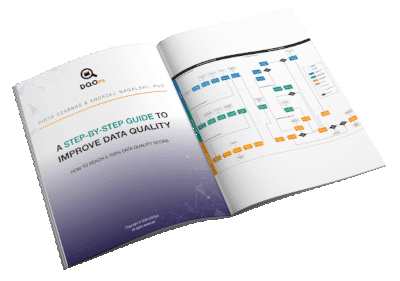
Data quality best practices - a step-by-step guide to improve data quality
- Learn the best practices in starting and scaling data quality
- Learn how to find and manage data quality issues
What is the DQOps Data Quality Operations Center
DQOps is a data quality platform designed to monitor data and assess the data quality trust score with data quality KPIs. DQOps provides extensive support for configuring data quality checks, applying configuration by data quality policies, detecting anomalies, and managing the data quality incident workflow.
The extensive API provided by DQOps allows full automation of all aspects of the platform, ranging from data discovery, data profiling, data quality testing, data observability, data quality incident management, and data quality reporting using 50+ data quality dashboards. DQOps also comes with the most extensive list of data quality checks, having more than 150 built-in checks, which allow to make data quality experiments and validate data from various criteria.
You can set up DQOps locally or in your on-premises environment to learn how DQOps can monitor data sources and ensure data quality within a data platform. Follow the DQOps documentation, go through the DQOps getting started guide to learn how to set up DQOps locally, and try it.
You may also be interested in our free eBook, “A step-by-step guide to improve data quality.” The eBook documents our proven process for managing data quality issues and ensuring a high level of data quality over time.


